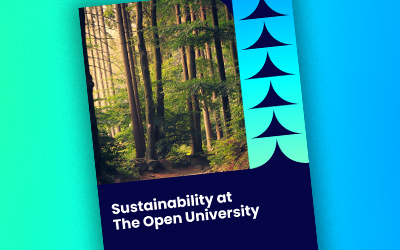You are here
- Home
- Environment and Social Justice
Environment and Social Justice

If we aren’t regenerating the planet, then we are destroying it.
An uncomfortable statement, but The Open University (OU) is no stranger to disruptive innovation. In 1969, Prime Minister Harold Wilson’s vision for a university of the air, with an open access policy to students from any background or location, was met with scepticism. More than fifty years later, the OU has helped more than 2.3m people achieve their learning goals – and our mission has evolved into one of environmental and social justice: adopting sustainability as one of our five institutional goals.
Sustainability is—and must be—for everyone. This starts with green skills and extends into a robust set of 21st century competencies with which we, as educators, must strive to equip each person in our local and global learning communities. The world has fallen short of its target to limit global temperature increase to 1.5 degrees above pre-industrial levels, and we now face the consequences: climate volatility, rising sea levels, coastal erosion, and highly pressurised ecosystems. We must act. Confronted with this shocking reality, we are called to disrupt and innovate radically different ways of living: educating and empowering people to be positive forces for regeneration, and to prioritise regenerative practices in our homes, businesses, and nations must be our focus.
Sustainability means more than just reducing greenhouse gas emissions. At the OU, we believe there can be no environmental justice without social justice – that responding to the climate and nature crisis through applying our learning also means protecting people’s rights, disrupting the corruption of Governments, safeguarding food supply chains, and improving living conditions now and for future generations worldwide. Change is too incremental – transformation is what is needed. Ensuring a sustainable planet is one of our most significant existential challenges, with many interconnected problems and opportunities. We believe this requires thinking beyond academic silos and disciplines, bringing together experts from anthropologists to astrobiologists and political scientists to physicists to address diverse challenges, from acting to robustly support indigenous communities in environmental protection to retrofitting our cities to make them more comfortable and low carbon for all.
Our teaching, research and knowledge exchange supports environmental and social justice by creating a shared understanding, identifying opportunities, and bringing people together. Underpinned by our scale and reach through our student body of 208,000, our alumni community of 2 million, our free online learning community of 10 million+, and our public education programming that reaches across the globe, the OU is committed to aligning our heritage of disruptive innovation with opportunities to create a regenerative future.
Sustainable development is of critical importance and requires innovation, which can only be achieved by involving all stakeholders, including you. Every aspect of society is evolving to meet major challenges in sustainable energy and environmental protection, with political debates now dominated by sustainability issues and increasingly (and not quickly enough) pivoting to regenerative alternatives. Technology, policy, and governance innovations are at the heart of hastening this change.
Technology innovations are critical for sustainable development. Research breakthroughs and deep behavioural insights are essential in navigating society into a climate-safe future. This requires the passion, intelligence, and dedication of talented individuals and coordinated teams, with true interdisciplinarity and transdisciplinarity skills to design sustainable systems. Sustainability challenges will not be solved by siloed scientists, but by a diverse range of creative people with different specialities, experience, and ideas collaborating meaningfully and learning together.
I am very proud that The Open University has established a supportive framework for interdisciplinarity to thrive. Our Open Societal Challenges research has the ultimate aim to connect talented academics from across disciplines to focus on impactful research that supports our planet by protecting what we have left and regenerating what we have lost. I hope you enjoy reading more about the work we are doing.
Tim Blackman
Vice-Chancellor
Skills for Net Zero
Organisations across the UK have committed to reach Net Zero emissions by 2050. Educators play a key role in the just transition to a sustainable economy. We are uniquely positioned through our graduates, alumni, funders, and partners to build and embed skills across our curriculum and in the workplace. We also champion climate research and action in our wider learning and partnership alliances. Together we can become good ancestors to future generations and deliver sustainability and nature protection.
Carbon Literacy is a good first step to address Net Zero. It raises awareness and understanding of carbon costs and impacts, equipping individuals and organisations with the tools to reduce their carbon footprint. The OU approach is that ‘sustainability is everyone’s job’. We have committed to upskill and reskill all our staff on decarbonisation, improving the sustainability of our processes and products – this is lifelong learning in action. The OU, as a unique four-nation organisation, is committed to learning good practice from the Welsh Well-being of Future Generations Act, Scotland’s public body Climate Change duties, and Ireland’s deliberative democracy approach.

Explore Sustainability Projects
Explore research and outreach projects currently seeking funding at The Open University.

Download the Sustainability brochure
Read about sustainability projects at the OU.